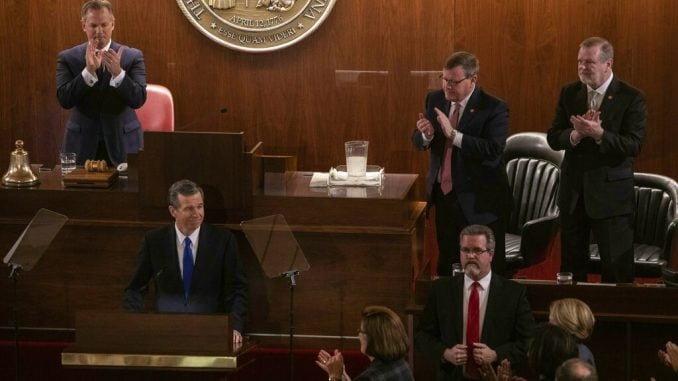
RALEIGH — Members of the North Carolina legislature gathered in the state House chambers Monday night with other state officials and dignitaries to witness Gov. Roy Cooper give his biennual State of the State address.
With many more members of his own party present after some gains in last year’s elections, Cooper said, “The people of North Carolina are determined for us to work together. They have spoken. They want a more balanced approach to government.”
Cooper frequently returned to this theme of determination. In his closing moments, he brought these elements together, saying, “Just like the people I met along the way, I’m determined. I’m determined to make our state better. I believe you are too. Starting tonight, let’s figure out how to best serve those who sent us here. There’s nothing a determined North Carolina can’t do.”
In this spirit of cooperative divided government, there were bipartisan ovations for much of the governor’s speech on issues like education and hurricane relief. Certain moments, like on eliminating coastal drilling and on climate change, received only applause from his Democratic colleagues.
As Cooper called for an expansion of Medicaid in North Carolina, Republican response was mixed, with scattered applause from some seemingly receptive to a call the GOP has long resisted in the state. Cooper used a common Democratic argument that tax money is already leaving the state to cover this expansion in other states, so North Carolina is missing out on what’s already theirs.
Asking a doctor attending as his guest to stand, Cooper referenced this doctor’s work with the uninsured in Watauga County as support for expanding coverage.
“Dr. Adams believes that as soon as possible, we should expand Medicaid,” Cooper said. “Let’s follow the doctor’s order.”
After Cooper’s speech, Senate Leader Phil Berger (R-Rockingham) gave the official Republican response.
Pushing back on some of the governor’s critique of the Republican record on education, Berger said, “Republicans have invested record-breaking sums in our state’s education system. Teachers have received pay raises for five consecutive years, and those raises were at or near the top in the entire country for three of those years.”
Much of Berger’s response was aimed at Cooper for allegedly not acknowledging the Republican role in the large economic growth in the state.
“That philosophy has guided eight incredible years of growth and progress under Republican legislative leadership, and it’s that philosophy that will continue to guide us moving forward,” Berger said. “Effective governing also means dealing in facts, not fanciful and unrealistic hopes and dreams, and certainly not lodging insults to distract from the merits of an issue. And the facts of responsible Republican leadership are indisputable. Under those policies, graduation rates are up, incomes are higher, taxes are lower, and more people work today in North Carolina than any other time in state history.”
Cooper was escorted into the chamber by a bipartisan delegation from both the House and Senate. Lt. Gov. Dan Forest, a Republican who is Cooper’s likely 2020 challenger in the North Carolina governor’s race, presided over the joint session.
